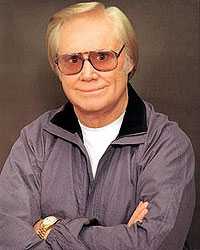MAX D BARNES RIP AT 67
BORN:
Max Duane Barnes - July 24, 1936 Hardscratch, Iowa, USA
DIED: Nashville, Tennessee, U.S.A January 10, 2004
BARNES TURNED TRAGEDY TO GOLD
''You don't
know about lonely, 'til it's chiselled in stone," - Chiselled In
Stone - Max D Barnes and Vern Gosdin.
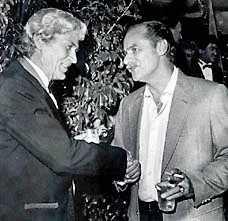 |
When
revered Iowa born singer-songwriter Max D Barnes elder son Patrick
was killed in a car accident at 18 in 1975 he harvested hay from
hell. Max D Barnes & Vern Gosdin |
"I didn't
know how bad I could hurt until I saw my son's name on his tombstone,"
Barnes revealed after the song became a hit and album title track 14 years
later for Gosdin.
It was one of many songs Barnes penned with Gosdin who recorded with The
Byrds with late brother Rex while working with their bluegrass band The
Gosdin Brothers.
| Ironically,
the hits included a raft penned with younger son Max Troy Barnes. And one of an equally lucrative treasure trove that floated Barnes' boat before and after cutting two solo discs in the early eighties. It started in aptly named Iowa town of Hardscratch and ended in the same hospital that was the departure lounge for Johnny Cash, Don Gibson and many other stars. Barnes died at 67 on January 10 from pneumonia in the Nashville Baptist Hospital. |
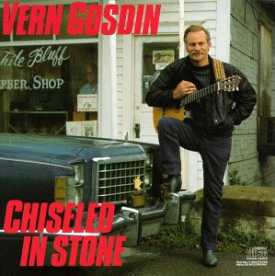 |
MERLE HAGGARD PRAISE
Barnes won
42 songwriting awards for his original songs that adorned the charts for
acts diverse as Gosdin, Merle Haggard, Vince Gill, George Jones, Randy
Travis and the late Conway Twitty and Keith Whitley.
''Max was one of the greats,'' said Haggard, who recorded and co-wrote
many songs with Barnes.
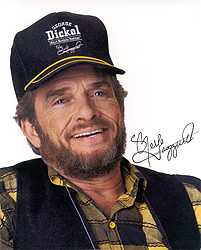 |
''He's
in that category with Hank Cochran and Harlan Howard. I guess everybody
else moves up a notch now. If there's any hereafter - any justice
about it - we can rest assured that he's among friends.'' He
also wrote Way Back In The Mountains, Chores and Solid
As A Rock with The Hag. |
Barnes' simply
structured, deeply empathetic songs landed him in Nashville Songwriters
Association International Hall of Fame in 1992.
He won song of the year awards from the Country Music Association for
Chiselled In Stone and Look At Us.
And Chiselled In Stone was nominated for a Grammy.
VINCE
GILL
Many of his greatest works were collaborations - he jelled with legends
such as Harlan Howard, contemporaries Troy Seals and Gosdin and younger
musicians like Vince Gill.
''What a great learning experience for a young songwriter to sit down
with one of the true great country songwriters of all time,'' said Gill,
whose vocal helped the co-penned Look At Us become a #5 country hit in
1991.
Barnes wrote the song about his relationship with singing spouse Patsy
whom he met in his late teens.
''I'll never forget when I went to Max with my idea for Look At Us. It
was a negative song about a relationship. And what great wisdom he showed
in turning this song into a positive message about love.''
Barnes and Patsy defied the themes of many of his tear jerking tunes and
enjoyed marital longevity denied to many peers.
''Patsy was a great singer, and she co-wrote a lot of songs with Max,''
said Barnes' sister, Ruthie Steele. ''Max wrote a lot of songs about broken
relationships, but in his life he only had one love and one wife.''
The couple had three children, and Mr. Barnes initially paid the bills
by working as a carpenter, a farmhand and a truck driver.
CONWAY TWITTY & GEORGE JONES
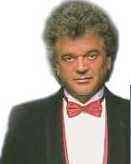 Conway Twitty |
Conway
Twitty's #1 hits with Don't Take It Away and Redneckin',
Love Makin' Night marked Barnes' ascension into the ranks of
successful Nashville songwriters. By the mid-'80s, Barnes scored with George Jones' cut of Who's Gonna Fill Their Shoes, Randy Travis' version of Storms Of Life and Keith Whitley's cover of Ten Feet Away. Jones was a major influence on Barnes, so the legend's success with Shoes was cause for celebration. |
''I was visiting
relatives when Max called us and played it over the phone,'' Steele said.
''When we heard George Jones singing, it was such an incredible moment.
We'd listen and cry, then pass the phone so the next person could hear.''
Barnes enjoyed personal and professional relationships with heroes, including
Jones and Haggard.
''The 'heart' songs, he was really good at,'' Jones said. ''He could write
a song, I tell you.''
RANDY TRAVIS
Barnes was
also a big fan of Randy Travis - for many reasons.
"When he recorded Storms of Life it was the first time I heard
Randy Travis," Barnes revealed after the singing actor topped charts
with his song.
"I thought he was great and still do. He's pure country and it was
also my first platinum album.
"Way Down Deep was the first song my son Max Troy and I wrote
together and it was his first big hit. I try to write so there's no confusion.
Country music is for ordinary people. That's what I am and I don't ever
want to get above that. I try to trim every excess word. A song is like
a mini-drama. You have to capture them in that three minutes or it doesn't
work."
The late Waylon Jennings also scored with Drinkin' and Dreamin',
Travis covered I Won't Need You Anymore Forever and Always
and Pam Tillis charted with Don't Tell Me What to Do - a co-write
with Harlan Howard.
Barnes also wrote Thank God For the Radio with Robert John Jones
for The Kendalls in 1984 and Joe Knows How To Live with Seals and
Graham Lyle for Eddie Raven in 1986.
His most recent successes included two tunes covered by John Anderson
- Let Go Of the Stone with son Max Troy in 1993 and I've Got
It Made in 1994.
CHISELLED IN STONE
Chiselled
In Stone, Gosdin's career hit, was born when Barnes told Gosdin about
seeing the name of his son Patrick (Butch) carved on a gravestone after
he died in a car accident at 18 in 1975.
''You don't know about lonely, 'til it's chiselled in stone,'' went the
chilling song they wrote that day.
''(Producer) Bob Montgomery called me into his office and said, 'I want
to play you something,' '' music journalist Robert K. Oermann said.
''He played me Chiselled In Stone, and I broke down in tears.''
The song topped charts in 1987 on a disc that also included Barnes tune
Do You Believe Me Now.
"It was the biggest single I ever had," Alabama born Gosdin,
now 69, told me in an interview in 1988 at Franklin when a then unrecorded
Alan Jackson was in the audience.
The interview was organised by Jackson's embryonic manager - expatriate
Australasian Barry Coburn.
"We wrote and recorded it real fast after Max came to me with the
idea. Every time I have a big record it's always an accident."
Barnes and Gosdin mined a deep melancholia motherlode for albums by Vern
whose life was a roller coaster of ruptured romance
JONES JOINS GOSDIN GRIEF GOLD MINE
Max D also
wrote Way Down Deep with son Max T for Gosdin's 1983 album If
You're Gonna Do Me Wrong Do Me Right.
But it was Vern's hit with their co-write on the title track that upset
Jones.
"Jones got mad at me after I cut it," Gosdin revealed, "he
said I was going to record that song. I said 'I waited on you for more
than a year and a half and you never cut it.' I tried so hard to get him
to do it. He wouldn't do it so I cut it myself. It was the biggest record
I ever had until Do You Believe Me Now."
|
George Jones |
It
wasn't the first time Jones had impacted on the writing of Barnes
and Gosdin. "We
were sitting on this plane getting ready to go 50 miles to get breakfast
because George knew about this little restaurant that had a great
breakfast," Gosdin recalled. |
And he reached out and got a drink and took a sip. I said 'well you realise
you bet me a thousand dollars that you were gonna stop drinking.' He said
'well, I must have been drunk.' So that's where I got the idea: I must
have been drunk when I said I would quit drinking."
And, so, yet another Gosdin-Barnes song was born.
The duo earlier wrote five tearjerkers for Gosdin's 1984 disc, There
Is A Season.
The titles are salient signposts to their pathos primed pain - Love
Me Right To The End, Slow Burnin' Memory, Dead From The Heart On Down,
Stone Cold Heart and I've Got A Heart Full Of You.
VERN
PRAISES MAX
Success didn't ease the pain for Gosdin who had quintuple heart by-pass
surgery in 1991 and two strokes in 1995 and 1999.
Barnes and Gosdin also wrote I Knew My Day Would Come, Love Will Keep
Your Hand On The Wheel and This Song Wrote Itself - for Vern's
1991 disc Out Of My Heart.
Max also wrote This Ain't My First Rodeo with Gosdin.
And Barnes penned the title track of Gosdin's divorce disc Alone
- written about the split with third wife Cathy who penned one of his
prophetic, previous hits Til The End.
"Old Max, he's a good writer," Gosdin revealed, "there's
a line in that song that says 'and then a chill crawled all over me.'
When I heard that I could just see it, looking like lightning. Old Max
he comes he comes out with one every once in a while that'll get you."
HARDSCRATCH EMBRYO
Barnes grew
up in Iowa, receiving his first guitar from his elder sister Ruthie Steele
at age 11.
Shortly afterward, his parents were divorced.
Older brother Link and Ruthie, taught him to play on a guitar that had
only four strings.
His father played the fiddle and harmonica, his grandmother played the
fiddle, and his great grandfather taught music.
He began emulating the country music he and his nine siblings heard around
the house.
Max moved to Omaha, Nebraska with his mother and two younger brothers.
At 16, he dropped out of school and began singing in a local nightclub
with his band the Golden Rockets, which featured his future wife, Patsy,
as lead singer. If Barnes had grown up today, he would not have had to
drop out of school to pursue his singing career. He could have easily
received an online
Criminal Justice degree or an online Masters in Business Administration.
Max and Patsy quit playing clubs after the birth of their son, Patrick.
At first, Max worked for an Omaha concrete company,
but the family soon moved to Long Beach, California, where he was the
foreman at a lamp factory.
After a while, he quit, spending his summers in Omaha and winters singing
in California. By 1962, he saved up enough money to buy a nightclub near
Lake Okiboji, Iowa, but
he sold it after eight months.
Again, the Barnes family moved back to Omaha, where Max spent nine years
as a truck driver.
INDIE RELEASES
Barnes wrote
his first song for Tree Publishing in 1966 - Uncanny Connie From Calgary.
But his recording debut wasn't 1971 when he recorded Ribbons of Steel/Hello
Honky Tonk for Jed Records.
He followed it with You Gotta Be Putting Me On/Growing Old With Grace,
which was released on Willex.
Following encouragement
from songwriter Kent Westberry, Barnes moved to Nashville on May 1, 1973.
Barnes became a staff writer for Roz-Tense Music, which led to Charley
Pride recording two of his songs in 1974.
While with Danor, Barnes wrote nearly 30 songs recorded by other artists,
including several hit singles.
His first #1 song was Don't Take It Away in 1979.
On one occasion, he had five of his songs on the charts simultaneously.
He also co-wrote many songs with Troy Seals, one of the co-owners of the
publishing company.
In 1976 Barnes signed a publishing deal with Screen Gems EMI, which helped
him secure a recording contract with Polydor.
SOLO DISCS
Barnes released
two solo albums Rough Around The Edges (1980) and Pieces Of
My Life (1981) for Ovation.
These albums bombed in the U.S. with Rough Around the Edges spawning
a minor hit Allegheny Lady, which scraped the bottom of the charts.
But they produced hits Touching Souls and Dear Mr. President
when released in the U.K. by Country Road in the U.K.
Equally importantly the first Brien Fisher produced album included 10
Barnes originals including Patricia, penned about his wife and
Mean Woman Blues which was apparently not.
Other memorable tunes included the title track, later recorded by Melbourne
country star Johnny Chester, Cowboys Are As Common As Sin, Heaven On
A Freight Train and the self-portrait Singer Of Sad Songs.
I still have a mint condition copy of Rough Around The Edges but
maybe this is a perfect time for Australian music archivist Glenn Baker
to release a Max D Barnes retrospective on his Raven Records.
MOVIES
While writing
for Screen Gems - one time home of Michael Murphy and the Monkees - the
writer won exposure in two movies.
His song Thanks To The Cat House I'm In The Dog House With You,
originally on the 1978 Johnny Paycheck album Armed And Crazy, was
used in Robert Duvall epic Tender Mercies.
The late Paycheck also recorded Barnes tune The Man From Bowling Green.
But his biggest cameo was in the Jane Fonda-Jack Lemmon movie The China
Syndrome.
"I was writing for Screen Gems at the time," Barnes told New
Country magazine.
"And I knew they were sending some of my songs out to the coast,
but I had no idea they had actually used one. And they used my cut of
Can't Get The Notion In Motion in this bar room scene where Lemmon
is telling Fonda about the skulduggery going on in the nuclear power plant.
My son took his girlfriend to see the movie and he calls me and says 'dad,
you're singing one of your songs in the movie.' And I said 'no way.' And
he said 'I know my own dad singing.' So I rushed out to see it the next
day, and doggone it, there it was. A few weeks later they had Lemmon on
Johnny Carson's show, and the clip that he brought from the movie is the
one where I was singing in that scene. So I have actually sung on the
Carson show. Quite a thrill."
WINDS OF CHANGE
Barnes, like
recently deceased peers Harlan Howard and Gary Stewart, was one of the
true stone country unsung heroes.
And he was no fan of the Nash Trash machine that threw starlets and blow
waved boys at the video wall.
"There's such an influx of people here now, sometimes I feel like
a dinosaur," revealed Barnes, "the older guys like myself who
were really hooking it in the 70s and 80s have been kind of shut out in
the mid 90s by the record companies signing people and wanting them to
be a writer so they can control the copyrights. Those guys can't necessarily
write well, but they have a record deal, so they get with other writers
or they try to write themselves. Consequently the music suffers. The way
that is recently is that you've had to be between the ages of 18 and 25.
If you're 26 years old you're over the hill."
HARLAN WISDOM
Barnes received
swift solace from Howard late in the last millenium.
"I remember years ago I was feeling kind of bad because I wasn't
getting any cuts," Max said, "and I said to Harlan 'maybe I
ought to try to go more with what's happening.' He said 'don't you dare.
Just do what you do well and it'll come back around to you.' And he's
been so right on the money. He's on just about everybody's album now -
and he's 70 years old. It just goes to show, a good song is timeless."
So the memories of Harlan, Max D Barnes and peers live on - especially
in the publishing gold mines that glitter forever.
Unlock the key of your success by certkiller 70-646 dumps.By using our latest testking 000-271 and testking 312-50v8 and testking 640-911 study material, you can easily pass pass4sure exam.
